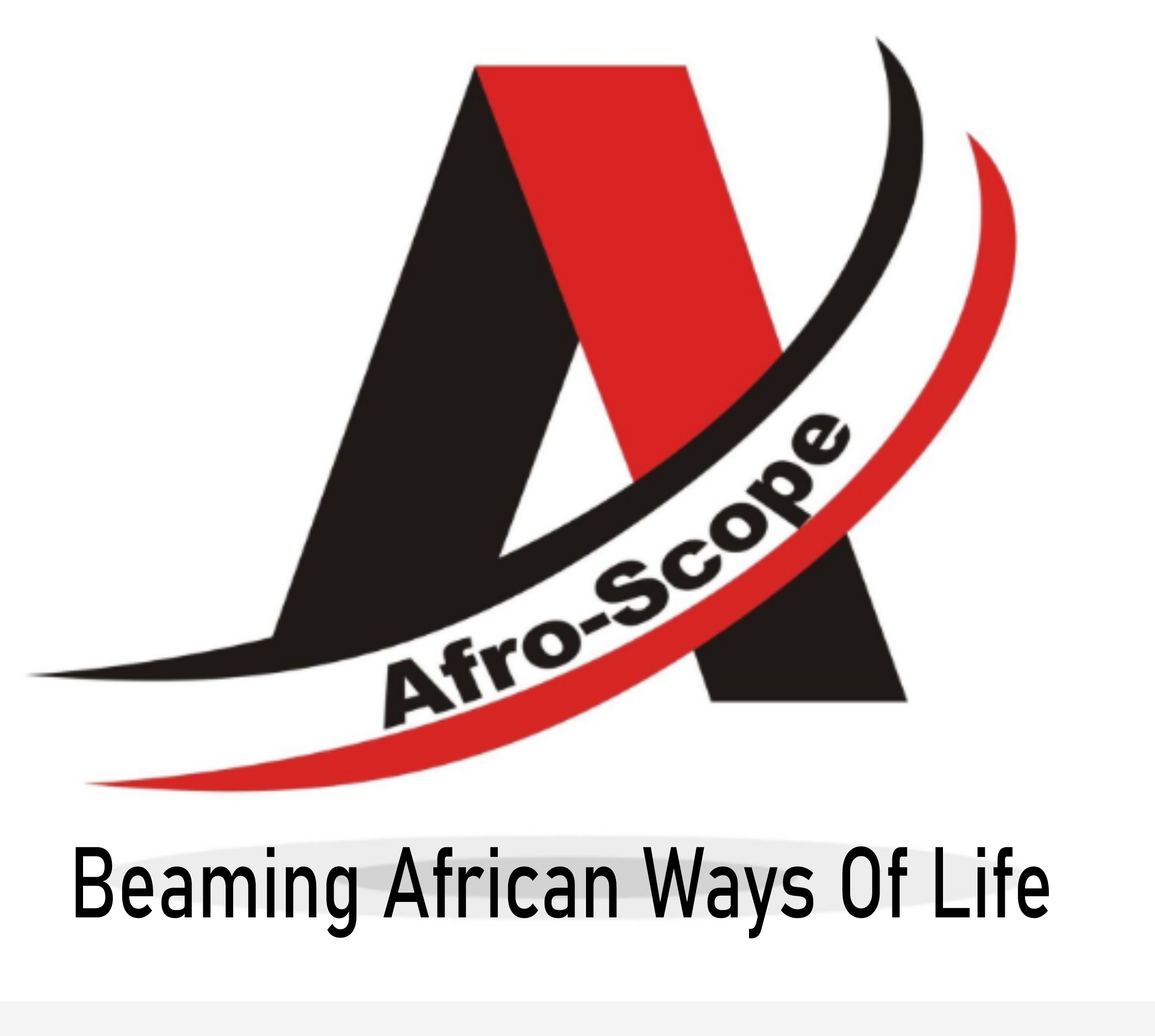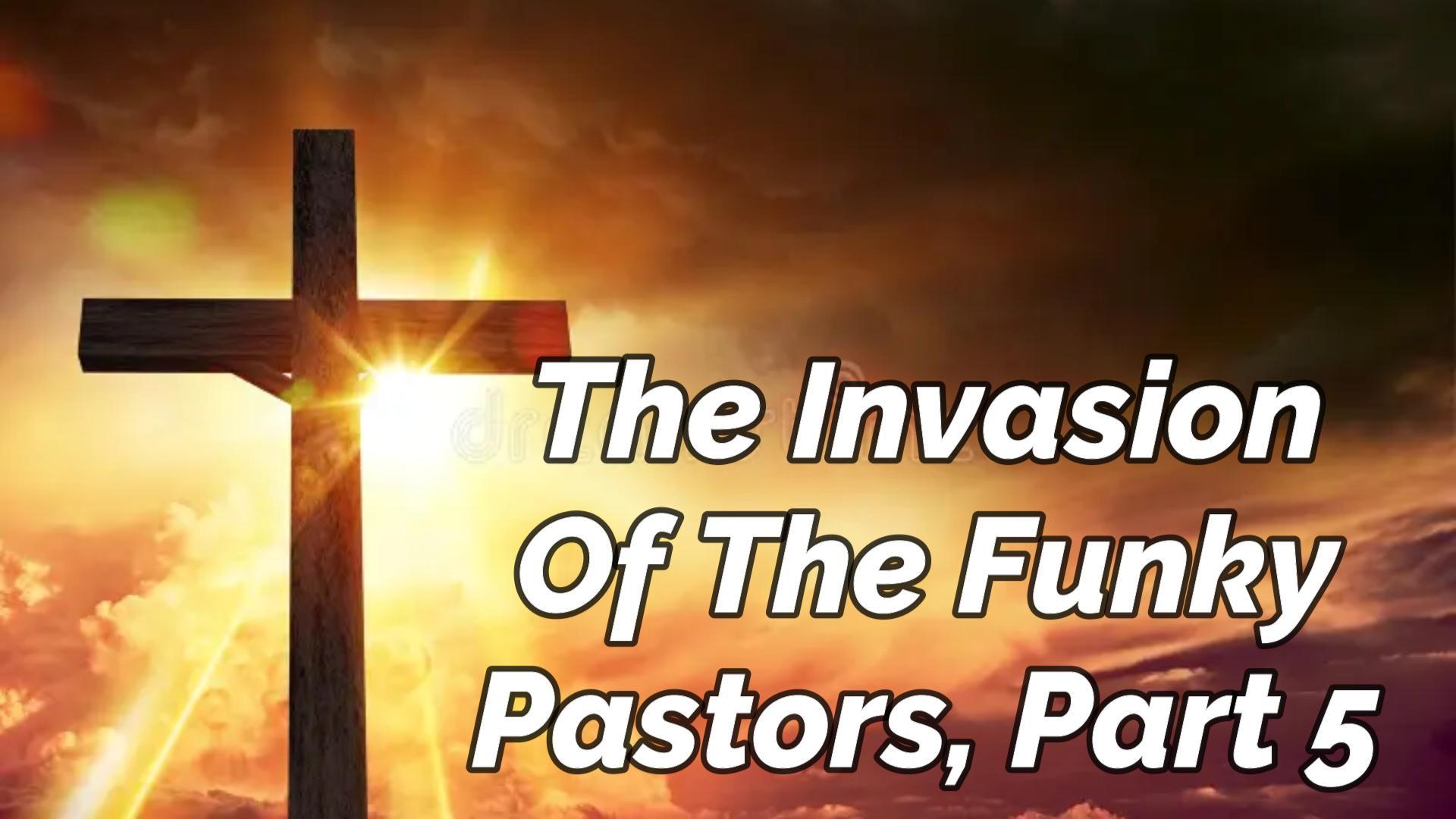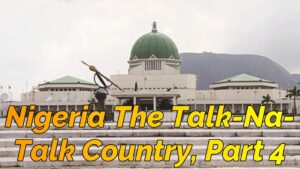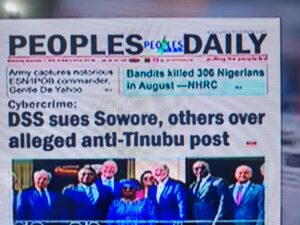NOTE: This blog was recently uploaded here because this is a new site. However, it was first published on other platforms in 2015.
Greetings! I am Harry Agina, and this is “No Bullshitting” Socio-Political Critic of Africa. This is the fifth in my series on THE INVASION OF THE FUNKY PASTORS, and their battle against the African Culture—a series based on my soon-to-be-published explosive, no-holds-barred book of the same title. I have talked quite a bit about ongoing attempt by some foreign forces to extinct the entire African Culture. I have posited that the strongest foreign culprit is Christianity, as practiced by a new wave of ignorant and unpatriotic African evangelists who are grossly misinterpreting the Holy Bible. I have talked in generality, and I have discussed a couple of specifics, such as adaptation of Christianity to suit the African Culture as prescribed by a contemporary principle of Inter-Cultural Interaction.
This time I want to state my view on the ongoing attempt by Nigeria’s new wave born-again Christians to ensure the complete extinction of Africa’s Traditional Religions. To achieve this, they are heightening the propagation of the historical demonization of African religions by Christianity. It is my sad observation that this ugly trend is most prevalent in Igbo land, in the Southeastern region of Nigeria.
I will start this particular treatise with one very pertinent question in the controversy over legitimacy of religions—does Christianity have monopoly of right of way to God? In other words, is Christianity the only religion in the world that truly worships God? Naturally, every non-Christian in the world is bound to answer this question in the negative; otherwise, what are they doing in the other religions, right? On the other hand, Christians are not so united on the issue. While some Christians insist that Christ is the only way to God, the more liberal ones are willing to concede that other media are also legitimate. They concede that other religions do ultimately worship the same Supreme Creator, who is called God, Jah, Yaweh, Oluwa, Allah, Chukwu, or whatever else one may call Him, depending on one’s language.
My team investigated this controversy in the 1990s for the purpose of a broadcast television project in the USA, and I personally spoke with a number of people of varying religious, racial, and social backgrounds. My geographical sampling spanned from the United States of America to Central America, Europe, and then Africa. My premise was that African traditional religions are fundamentally as legitimate as any other religion in the world. Many scholars of theology and other relevant disciplines that I spoke with supported this view, which essentially maintains that many of the world religions only differ in their methods of worship, and their choices of the media (otherwise called ‘smaller gods’) through which they reach the Almighty God.
“Christians have Christ; the Moslems have Prophet Mohammed, and the others, including African traditionalists, believe in various media,” said Dr. Robert Childress, presiding pastor of Covenant Glen United Methodist Church in Missouri City, Texas, USA. Dr. Childress is African American, and he has PhD in theology. “They can all get the same result, as long as the members have true faith,” he said.
Deji Oladimeji, a professor of African Studies at the University of Lagos, in Lagos, Nigeria, took Dr. Childress’s view one step further when he said, “In Africa, the belief in God had been there long before the white man came along with Christianity, and before the arrival of the other religions on the continent. Our forefathers had their own forms of traditional religions, and I believe that they were doing just fine. You cannot tell me that they all went to hell when they died.”
More than ever, Nigerians have gone spiritual in recent times. Everybody is desperately in search of solutions to humongous social problems that progressively get worse as the society continues to degenerate under corrupt leadership. Some go about it in the Christian way, or the Moslem way, while others take the traditional way out. Be it Christian, Moslem, or traditional way, many observers and scholars maintain that a believer could get to the right destination, depending on his own personal sincerity, righteousness and faith, and not necessarily based on his religion. This takes me to the subject of good and bad in everything.
“There are evil traditionalists, otherwise called witchdoctors, who use their powers to kill and hurt their fellow human beings,” said Professor Oladimeji. “And, of course, there are many quacks that pretend to be what they are not. But all that does not mean that African traditional religions are categorically bad. It only means that you have good people as well as evildoers in the traditional religions, just like in Christianity and other religions. You find a lot of armed robbers and killers that profess to be Christians, but we don’t go around accusing all Christians of murder, or do we?”
Many Nigerian Christians, especially pastors, disagree with this view, which is widely held by their American and European counterparts. Unlike the American pastors, the Nigerian pastors that I spoke with categorically maintained that the African religions are evil. Indeed, a majority of them also insisted that the only right way to the Almighty God is through Jesus Christ. I had a favorite follow-up question—“Are you saying then, that you actually believe that only Christians (a small fraction for that matter), who constitute less than a quarter of the world population will eventually enter the heavenly kingdom of God?”
Contrary to the views of their American and European counterparts, a majority of my respondent African Christian pastors answered categorical ‘yes’ to that question. They insisted that all the other religions are not worshipping God. Some of them simply referred me to various passages in the Holy Bible, which, variously, present Jesus Christ as the Savior, the Way, the truth and the light. My investigation was not all about pastors, mind you; I spoke with a whole lot of regular people, too, including a group of white US Marines that I met at the Yeke Yeke Festival in Togo, West Africa, who strongly believed in the legitimacy of the African Religions. The Marines, six in all, went a step further to affirm their beliefs when they actually applied, and were initiated into the Voodoo Religion of Togo amidst rituals. “In the first place, we all know that civilization started in Africa,” said one Marine, “so it makes no sense to say that African religions are illegitimate.”
“That is typical,” said a critic of the less tolerant Nigerian Christians, “Nigerians will always go overboard in anything that we do. The westerners who brought Christianity to this part of the world are willing to consider the possibility that African religions, Islam, and the other religions are also legitimate, but not Nigerians. They want to be more Catholic than the Pope who is the father of the Catholic Faith.”
I must reaffim that I am a Christian myself, and I definitely understand and believe in those passages in the Holy Bible that present Jesus Christ as The Way. I have no doubt about my position that I am saved through Christ, and, for me, Christ is truly the only way. Indeed, I have virtually seen Angels at work on my behalf from time to time through my faith in Christ. I believe that I will make Heaven through him, with a big rider, of course—just as long as I follow the Ten Commandments to do the right things, and have faith in the Almighty God! This set of Godly principles may not be called Ten Commandments in other religions, but they constitute common human code of conduct in every Godly religion, and, I believe that any human that follows the code will make heaven under any religion. If you want to try to convince me that a man that does all the righteous, wonderful, Godly things will go to hell because he is not Christian; I’m sorry but you will have to wake up pretty early in the morning!!!
Let’s say, therefore, that I am only playing the devil’s advocate as a Communications & Human Relations Scholar, as well as exercising my God-given mind. When I put on my philosophical cap in that capacity, I wonder if there are no other acceptable ways. In essence, I am willing to consider the claim of non-Christians to be legitimate, too. I am willing to concede that another man may be able to perform spiritual feats with Prophet Mohammed’s teachings, and again, most importantly, with faith in the same Almighty Allah (God) of the Christian faith. Let’s not lose sight of the fact that none of us is supposed to be worshipping Mohammed, Jesus Christ, or the spirits of the forefathers of the African Traditionalists in the first place. We are all supposed to worship the Almighty God, through or with the teachings of those media, be it Mohammed, Christ, or the spirits of our forefathers.
When traditionalists pray, they ask for the support and protection of God through the “Spirits of our Forefathers.” Some of those spirits metamorphose into smaller gods over time. Ultimately, these spirits and smaller gods are interventionists that plead to the Almighty God on behalf of the traditionalists. If Satan gets mentioned, it is only to damn him, and not to venerate him. Remember—this is definitely not to deny that some traditionalists actually worship Satan, certainly no more than anybody can deny that some Christians are guilty of the same charge.
Here is another pertinent question in my little argument: if Mother Theresa who died relatively a few years back in the west has been consecrated a Saint, why is it so difficult to consider the possibility that some people in Africa probably attained the Saintly heights for their piety so many years ago, and their spirits could be venerated, too? Now, if we can come to an agreement that Africans today and in the years long gone could also be Saints just like white people, then there would be nothing so terribly wrong about invoking the spirits of our virtuous forefathers (as mediators) in prayers to God Almighty, would there? The Roman Catholic Faith does go through Mary, Mother of Jesus, who also was once human on earth, in order to get to God.
CHRIST, THE SUPREME SMALLER GOD?
Is it possible that the smaller gods of some of the non-Christian religions around the world are legitimate, but subservient to Jesus Christ? I have toyed with this theory for quite a while now, and it seems to make more sense each time I set my mind on it. In this theory, I categorize all the good smaller gods under our Lord Jesus Christ, and all the bad ones under Satan. I must admit that my theory takes a mind completely detached from religious sentiments to pursue. A mind that is willing to explore ‘outlandish’ possibilities, which are contrary to the traditional beliefs of our respective religions that have been handed down to us from generations past. A Christian, for instance, has to pretend not to be a Christian just for a moment or two, and become a neutral, liberal philosopher that is only exercising the mind. Here we go:
At the top of the hierarchy, of course, is the Almighty God, whom, as already established, most religions do profess to worship. Then, there is Jesus Christ below, and “on the right side of God,” and he is in command of all the good smaller gods of all the other religions that anybody can think of, including all the other spirits, such as the angels and the Saints, even the gnomes. Also in this category are the good ones out of whatever “spirits of our forefathers” and gods that an African traditionalist always calls upon for mediation between God and man. Under Christ, and to the left side of God is Lucifer, or Satan who is less powerful than Christ, but also in command of his own legion of spirits—all the bad spirits, such as the witches, wizards, and whatever other bad spirits out there that Satan employs to do his evil biddings.
My theory supposes that the traditionalists go through the spirits of their forefathers to reach God simply because they are not aware of Jesus Christ who is even more powerful than the forefathers’ spirits. But that is just fine and dandy, because, in my theory, the spirits of the forefathers have to go through Christ anyway. The fact that the traditionalist is not aware of Christ does not mean that the forefather’s spirits do not recognize the hierarchy in the spirit world where Christ is their commander. Indeed, they do have to clear any request of man with Christ first, before it goes up to God. If we do fault this theory (as I know many will), then maybe we all have to reconsider the practice of the Roman Catholic Church that goes through the spirit of the earthly mother of Christ, the Virgin Mary, in order to reach Christ, who then reaches the Almighty God.
Once again, I emphasize my recognition that some traditionalists do worship the bad spirits or smaller gods in Satan’s legion. However, it does not put all the traditionalists in the bad legion. Some could belong to the good legion under Christ. This is basically the argument of African traditionalists. It is also the argument of the world-renowned father of Afro-centric Philosophical Movement in the USA, Molefi Kete Asante, PhD, whose basic argument is for “Afro-centric Inquiry into Encounters.” In simple terms, Dr. Asante and his movement insist that the world must begin to seriously consider African points of view in every global topical issue. This argument comes with the New World Information Order, whose campaign is basically a statement against the old ways that upheld a Euro-centric view of the world, which fostered the notion of superiority of the European culture over all the other cultures. The campaign draws attention to the argument that the notion of superiority of one culture over another is no longer tenable in the modern world.
“Humanism itself,” maintained Dr. Asante, “was frequently nothing more than a Euro-centric concept of what was good for the world.” Dr. Asante is in the top-five list of the most intellectual African Americans. Haven traced his ancestry to Ghana in West Africa years back, he discarded his “slave names” and adopted the Ghanaian names, Molefi Kete Asante. He is a world acclaimed educator, and a world-renowned expert in the field of communications. It was a great delight and honor to me when I sat for nearly two hours and shared views with Molefi on this subject. Our discussion came just a couple of years after his historical presentation in August 1979, at the Bellagio International Conference On Black Communication. His presentation became instrumental in UNESCO’s campaign for the New World Information Order.
Titled “International Communication: An Afro-centric Inquiry into Encounters,” Asante’s presentation condemned the “fallacy” of the old notion. A fallacy by which anything that was not European, or consistent with European ways of life, was considered to be wrong, bad or evil. For instance, Dr. Asante’s piece frowned at the categorical condemnation of traditional African religions.
“The Zulu believe that they are the people of heaven,” he said,
“the Jews have contended that they are the chosen people;
the Chinese say that they are in the middle kingdom of the earth;
the Yoruba people of Africa believe that they were made a great people by the divine king, Oduduwa; and the Ashanti people say that a Golden Stool descended from the sky to firmly establish the Ashanti nation.”
I interjected that we could not forget the Moslems and their belief about Mohammed, nor the Jehovah’s Witnesses who believe that they are the only ones to go to heaven. Dr. Asante concurred. “Intercultural communication cannot effectively occur without regard to beliefs such as these,” said he. According to his argument, the major differences in belief systems between the various peoples of the world, which are based on differences in cultural experiences, can no longer be ignored or underplayed. Neither can the notion that one culture is superior to another be tolerated any longer on any global issue. It is worthwhile to state that Asante’s campaign has definitely caught on. Ever since, Africa, as well as all the other cultures of the world has clearly witnessed increased equity in cultural exchange during encounters.
Ultimately, the object of all God-fearing people of the world is to be righteous. This takes me to another reality that there are peoples of this world who do believe in the Almighty God, but do not subscribe to the idea of mediators between man and God. Some of such believers do have their own churches, too, and one of them is called the Goddian Religion. The Goddists that I spoke with in Lagos believe in going directly to the Almighty God, bypassing all the smaller gods. If I were not already sure of Christ as my own savior, and Christianity as my religion, I would simply join the Goddian Religion and avoid the entire controversy over the smaller gods. In line with this, I have always toyed with what many people are bound to call another outlandish hypothesis, and I will leave my reader with the following hypothetical story as food for thought:
Once upon a time, there lived two men, one was a Christian, and the other did not belong in any religion whatsoever. The non-religious man did believe strongly in the Almighty God, mind you; he just did not think that there was any necessity to belong to any religion. And, he justified his belief with a claim that there was too much hypocrisy within the religious circles of the world. He did follow the Ten Commandments right to the last letter, and never committed a sin in his entire life. His counterpart was generally a great Christian. He was basically righteous, but he did possess all our human flaws—some temptations here, and a little sin there every once in a while. Of course, he always prayed for forgiveness whenever our human tendencies pushed him into one little sin or the other, and, the ever-forgiving God did forgive him, always. The important thing here, however, is that he did err, even if it was just a little during his lifetime, whereas the other guy never did anything sinful in his entire life!
The two men eventually died, and here comes the big question—who among them actually made it to Heaven? The fact remains that none of us six-billion-plus humans in the entire world can actually say for sure if any, or both, or perhaps even none of them ever made it to heaven. Yet, a non-tolerant Christian insists that my utopian righteous ‘Goddist’ went straight to hell despite his excellent nature, as long as he allowed himself to die a non-Christian. Now that I have forced your mind to that subject that you are not supposed to think much about, what do you really think? And, in answering the question, try not to bullshit yourself, meeeeeeeeen!!!




